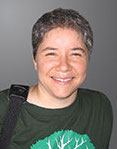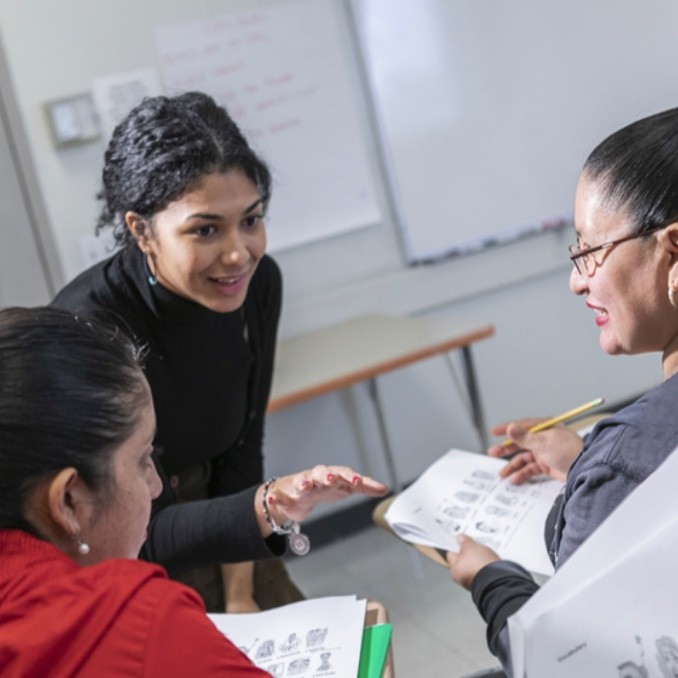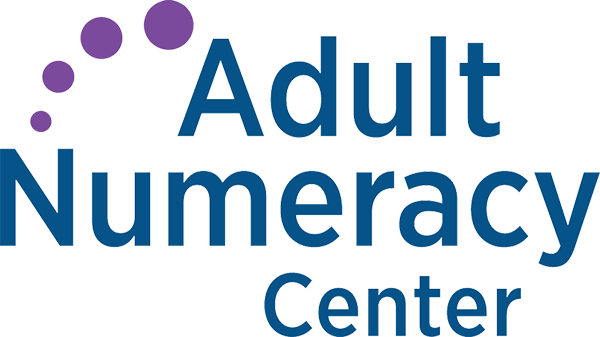Somos Mujeres en Matemáticas / We Are Women in Math
by Mercedez Casciato & Sarah Lonberg-Lew
To translate parts of this blog into your native language, visit Google Translate.
Para traducir partes de este blog a su idioma nativo, visite Google Translate.
As colleagues in the SABES Math and Numeracy Center, we (Mercedez Casciato and Sarah Lonberg-Lew) worked together to compile resources for Women’s History Month. In the course of our conversations, we reflected on our own experiences as women in mathematics. We want to share some ideas that came up in these conversations because they broadened our own perspectives about the diversity of the experiences of women and how we can support students and teachers of all genders in growing their mathematical identities.
Como colegas en SABES Math and Numeracy Center, nosotras (Mercedez Casciato y Sarah Lonberg-Lew) trabajamos juntas para recopilar recursos para el Mes de la Historia de la Mujer. Durante nuestras conversaciones, reflexionamos sobre nuestras experiencias como mujeres en el campo de matemáticas. Queremos compartir algunas de las ideas que surgieron porque ampliaron nuestras propias perspectivas sobre la diversidad de experiencias de las mujeres y cómo podemos apoyar en el crecimiento de sus identidades matemáticas a estudiantes y profesores de todos los géneros.
Reflexión sobre nuestras experiencias con el aprendizaje de matemáticas en la escuela / Reflecting on our experiences learning math in school
Mercedez dice:
Cuando llegué a Estados Unidos tenía 17 años de edad y acababa de terminar la secundaria. Vine a vivir donde mi prima y su familia con el propósito de sacar una carrera universitaria. Siempre me interesaron mucho las matemáticas pero mi pasión era la enseñanza. Cuando empecé la universidad, decidí estudiar matemáticas porque quería asegurarme de entender de forma profunda la asignatura que iba a enseñar. Siendo una estudiante ejemplar en República Dominicana, asumí que aquí sería igual. No obstante, las barreras de lenguaje y las adversidades que se presentan al vivir en un país extranjero jugaron un rol en mi desempeño en las clases. Mis calificaciones empezaron a bajar mientras más avanzadas eran las clases de matemáticas y no entendía el porqué si me estaba esforzando muchísimo. Incluso, me gradué de la universidad pero no me dieron mi diploma hasta un año después que pude pasar Algebra Lineal después de tomarla 4 veces.
En ese momento tuve una realización. La forma en la que aprendí matemáticas desde pequeña no necesariamente me beneficiaba a la hora de entenderlas. Podía fácilmente resolver ejercicios pero no aplicarlos a problemas de la vida cotidiana.
En retrospectiva, me hubiera gustado sentirme más cómoda en el aula de matemáticas para darle cabida a este tipo de problemas pero usualmente o casi siempre era la única mujer hispana en mis clases y esto, de un modo u otro, afectó mi confianza en mis conocimientos y mi autoestima al querer hacer preguntas. Siempre pensaba que todos sabían más que yo porque de un 100% de la clase, quizás un 90% eran hombres y del 10% no había nadie que se veía como yo. Mientras ellos participaban activamente, hacían preguntas al profesor y creaban grupos entre ellos, nosotras estábamos en completo aislamiento de manera involuntaria. Tampoco, sentía que los profesores ofrecían el apoyo necesario para que nosotras tuviéramos el mismo nivel que los hombres de autoestima y seguridad que, claramente, nos faltaba en el salón de clases.
Sarah says:
When I was in high school I didn’t plan to attend a women’s college or to major in math. I ended up at a women’s college because it happened to be the place that felt like the best fit for me. I took my first math class there because I regretted slacking off in math at the end of my senior year of high school. (I got an F in the fourth quarter!) That first math class was a special and transformative experience. It wasn’t until I was in a space that was free of men’s voices dominating the conversation that I realized that those were the kinds of spaces most of my math learning had been in before. Suddenly, I was in a classroom where every student’s voice was a woman’s voice and I didn’t question my place in the conversation or have to fight for my chance to be heard. There was an expectation that I would share my ideas—a feeling that my ideas were important and valuable. I took that class out of a sense of obligation, but I left having fallen in love with math as a space where I could pursue my ideas and interests; a space where I had something to contribute. I took more math classes after that and ended up declaring math as my major by the end of my second semester.
Reflecting on what else was different in that first math class, a strong image comes back to me of tables arranged in a U-shape so that we students could see each other and of our professor facilitating discussion, encouraging us to talk to each other and not just interact with him. The class was small, maybe 15 students, and our professor was passionate—about the math content and about our ideas. I could tell that he cared about our understanding because he got excited about our questions and our insights. It is possible for men, even men in positions of authority, to be part of spaces where women are empowered. Some of my college professors were men and some were women, but in all of them I saw powerful and smart people who believed women were capable of learning math at high levels, a belief made even more evident by their choice to bring their mathematical and teaching expertise to a women’s college.
Generally speaking, in my experience, the voices of men have been louder and more numerous, especially in traditionally male-dominated fields such as math and science. And that has a chilling effect on women’s voices. Men are conditioned to take up space in conversations and to believe that their ideas are important. As women, society teaches us the opposite—to make space for men’s ideas and keep our thoughts to ourselves. (Folks who live outside the gender binary are usually subject to these same societal forces based on how they are perceived or how they are identified at birth, regardless of their true identities.) Being able to study math in a space that was free of that dynamic helped me to find my own mathematical identity in a way that I doubt I would have otherwise.
Dónde nos encontramos hoy / Where we are today
Mercedez dice:
Llevo 5 años siendo profesora de educación adulta en español y más de dos años ayudando a otros profesores a que sus voces sean escuchadas. El hecho de que tuve que pasar por muchas situaciones en las que no me sentí que pertenecía o, tal vez, que mis necesidades como profesora no fueron escuchadas, a pesar de que exigí lo que necesitaba, me conllevó a hacer preguntas y buscar respuestas hasta encontrarlas. ¿Este es un problema individual o hay más profesores pasando por la misma situación? Si hay profesores pasando por la misma situación, ¿cómo puedo ayudarlos?¿dónde se encuentran estos profesores?
Gracias a mi arduo trabajo, estoy en una posición que me permite hacer las cosas que siempre quise hacer. Sin embargo, siento que mi arduo trabajo y todos los esfuerzos durante años no hubieran sido suficientes si no hubiera contado con la ayuda de personas con más poder o privilegios que me abrieron las puertas porque vieron mi potencial. Lo curioso es que nunca vi mi potencial como ellos lo veían, pero seguí adelante.
Algo de lo que estoy orgullosa es que pude crear una comunidad de profesores de educación adulta en español. Esto es algo que soñé hacer por mucho tiempo pero no me sentí capaz ni sabía cómo iba a hacerlo porque no tenía las herramientas necesarias. Contacté a alguien que conocí en un taller que él propició pero pensé que él no me iba a contestar. No obstante, me llevé una sorpresa porque no solo me contestó sino que usó sus privilegios para ayudarme, una mujer hispana que antes no tenía voz.
Cabe destacar que, antes y durante el proceso de crear la comunidad, no me sentía capaz de llevar a cabo este proyecto porque era la única mujer en mi programa, era la más joven y tenía menos tiempo enseñando como profesora de educación adulta en comparación a mis colegas. El hecho de que alguien creyó en mis capacidades y potencial más que yo misma, me dio la confianza para seguir con el proyecto. He conocido a colegas maravillosos y descubrí que no era la única que se sentía ignorada o no escuchada. El unir nuestras voces y trabajar juntos ha sido una experiencia motivadora y enriquecedora. Juntos, creamos una comunidad sólida y un espacio seguro para compartir ideas, experiencias y recursos.
Ahora como educadora me aseguro que mis estudiantes, sin importar su género, se sientan cómodos, apoyados y libres a la hora de aprender en el aula. Mis experiencias me enseñaron que el rol de educador influye en cómo el estudiante se siente con respecto a la asignatura y cómo su aprendizaje se ve afectado si no hay una red de apoyo o comunidad en sus clases. Adicionalmente, trabajo como consultora de matemáticas en una organización en la que cuento con un equipo increíble, donde la mayoría somos mujeres. Aunque soy la única hispana, me siento escuchada y apoyada y siempre se me anima a expresarme y dar mi opinión, algo que nunca había experimentado antes.
Sarah says:
Out in the real world, mathematical spaces not dominated by men are fewer and harder to find. In spite of my experience in college, I sometimes find myself feeling shut down or unable to advocate for myself when in a room where men’s voices are dominating. This can happen in spaces where men are in the minority, and even in spaces where women are in leadership positions. I experience stereotype threat— knowing that men who speak up are often perceived as assertive and strong whereas women who do the same can be perceived as demanding, pushy, or worse. It is still challenging to claim my space in the conversation.
However, one thing that helps is knowing what it feels like to be in spaces that don’t feel oppressive. This knowledge helps me seek out those spaces, recognize them when I find them, and be inspired to be part of creating them for anyone who has ever been marginalized—because I know it is possible. As a white woman, I am at an intersection of having privilege because of my race and not having privilege because of my gender. (On other matters of identity, I also fall sometimes on the more privileged side and sometimes on the less privileged side.) Seeing privilege from both sides like that equips me (I hope) to be an advocate for all learners, whatever the intersection of their identities.
Although we have different lived experiences, both of us belong to minority groups, therefore, many times our voices have been ignored or have not been heard. Other people have seen it as a weakness to be a woman and at times, we have even seen it that way ourselves. We have internalized what society has taught us about what our role is as women and must work consciously and constantly to push back against that message, a cognitive burden that men do not bear. But we also know that we do have a place in the conversation. People of all genders, of all races and classes and abilities belong in mathematical conversations, so it is important for all of us to be mindful of how we make space and take up space. When we find ourselves on the side of privilege, we can make sure our voices are not dominating and elevate the voices of those less privileged. When we find ourselves in the margins, we can step up and claim our place. None of these things are easy, but they are necessary if we are going to make math teaching and learning truly inclusive.
Aunque hemos vivido diferentes experiencias, ambas pertenecemos a grupos minoritarios, por lo tanto, muchas veces, nuestras voces fueron ignoradas o no fueron escuchadas. Al apoderarnos de lo que otras personas en algún momento consideraron como una debilidad el ser una mujer, puede que incluso nosotras mismas en ciertas ocasiones. Hemos interiorizado lo que la sociedad nos ha inculcado acerca de cuál es nuestro rol como mujeres y constantemente debemos trabajar de forma consciente para rechazar este mensaje. Esta es una carga cognitiva que los hombres no tienen que soportar. No obstante, también, reconocemos que somos parte de la conversación. Las personas de todos los géneros, de todas clases y habilidades pertenecen a las conversaciones matemáticas, así que es importante que seamos conscientes de cómo creamos y cómo tomamos espacio. Cuando nos encontramos en posiciones de privilegio, podemos asegurarnos de que nuestras voces no dominen y exaltar las voces de las personas que no tienen tanto privilegio como nosotros. Cuando nos encontramos al margen, podemos dar la cara y reclamar nuestro asiento en la mesa. Nada de esto es fácil pero es necesario si queremos lograr que la enseñanza y el aprendizaje de matemáticas sean verdaderamente inclusivos.

Sarah Lonberg-Lew has been teaching and tutoring math in one form or another since college. She has worked with students ranging in age from 7 to 70, but currently focuses on adult basic education and high school equivalency.
Sarah’s work with the SABES Mathematics and Adult Numeracy Curriculum & Instruction PD Center at TERC includes developing and facilitating trainings and assisting programs with curriculum development. She is the treasurer for the Adult Numeracy Network.

Mercedez is a bilingual adult education teacher who has taught a wide range of different age groups and students from different nationalities in the Dominican Republic, the US, and Spain. Most recently, she has focused on the adult education of immigrants in NYC. She co-created a community for adult ed teachers that offer their classes in Spanish. This community includes a list of over 100 educators across the US (including Puerto Rico). Along with other colleagues, she has also led and organized workshops called “Compartir entre Colegas” for those teachers who feel excluded from developing their knowledge in their native language.
